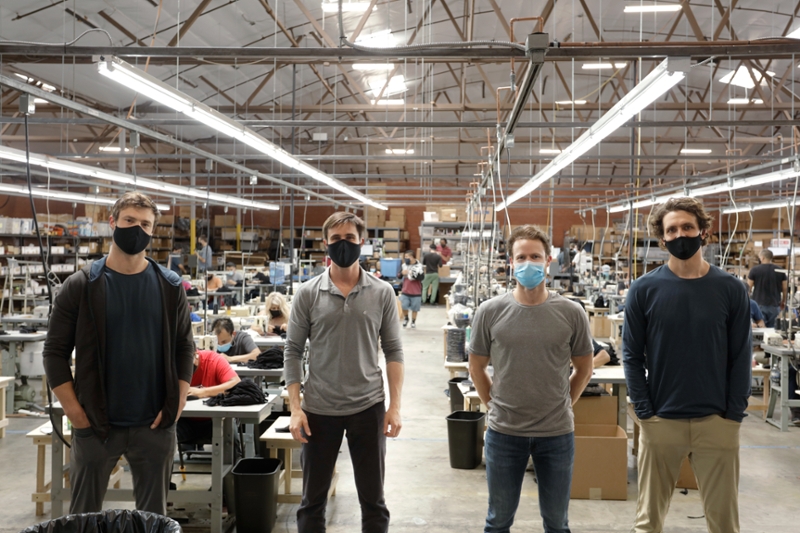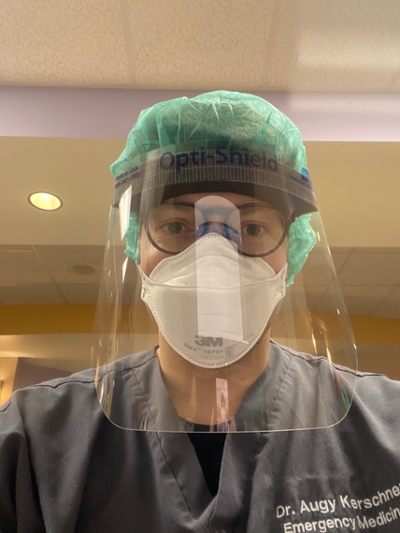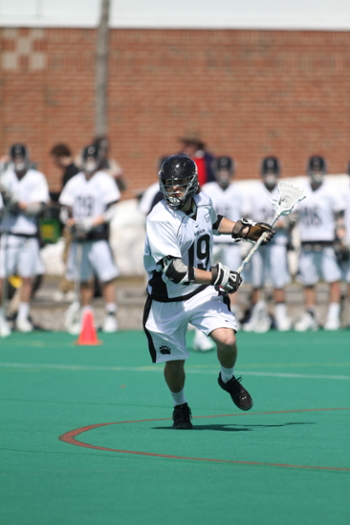Stand and Deliver: Pivoting from LAX to PPE
By Tom Porter“This is the most challenging thing our team has ever done,” says Jake McCampbell ’11, cofounder of StringKing, a leading supplier of lacrosse equipment, which also employs Jeff Cutter '09, Owen “Kit” Smith '11, and Mark Flibotte '12.
A couple of months ago the company was facing financial ruin. Now they’re busier than ever, making personal protective equipment for healthcare workers and others dealing with the COVID-19 pandemic. The story began, he says, when NESCAC canceled the spring sports program in March.
“The Monday following the NESCAC announcement, we cut our expenses by around 50 percent. That week was very difficult. We made some really tough cuts, and managers took sixty percent pay cuts. Everyone in the company had at least a 20 percent pay cut to keep as many people as we could.” StringKing’s sports business has since declined by over 90 percent, he adds.
The company operates a facility in China employing about thirty people, and it was while he was talking with his Chinese partner that McCampbell says he first got a true sense of the overwhelming need for personal protective equipment. “He told me there were thousands of new factories in China making PPE.”


McCampbell says he also got an idea of the acute shortage of equipment on his doorstep after a conversation with former classmate Yoni Ackerman ’11, a data scientist in Berklee, California. Ackerman, who’s currently taking time away from his job to volunteer with a community group making and delivering masks, became aware of the chronic situation early in the pandemic when his mother got sick. She wasn’t diagnosed with COVID-19, he says, and thankfully has since recovered. “I visited Jake’s factory in LA last year, so when the pandemic hit, I thought what a great idea it would be for StringKing for make masks. So, I contacted him with the idea, and three weeks later he called me back and said ‘we’re making 40,000 masks a week.’”
The ball really started rolling when McCampbell asked Stringking’s marketing head, Mark Flibotte, to post an announcement on Instagram that the company could help supply masks. “I didn't think it would get much of a response, but within three hours of that post, I had received over 800 emails from people and hospitals looking for masks,” says McCampbell.
“It was kind of an ‘oh sh*t’ moment, realizing the severity of the shortage and how stressful the next month was about to become. Faced with a global pandemic, I knew we were capable of providing real help by supplying millions of high-quality masks.”
StringKing set up a web page to receive PPE requests, explains McCampbell, and within a day they had requests for more than 200 million masks. “We basically put our heads down and worked twenty-one hours a day for the next ten days. We had no money to operate with so I called our investors and they wired us $500,000 within a few hours, so we could jump-start production.
Since then, says McCampbell, they’ve moved to a more sustainable fifteen-hour day, seven-day work week. “The amount of stress has been insane. We've been taking on massive orders from major hospital networks on razor-thin margins, often fronting millions of dollars for production.”



Production at StringKing has soared, and by late April, McCampbell says the company was outputting 300,000 surgical masks and 75,000 gowns on a daily basis, supplying three major hospital networks. “Our masks are manufactured under standard GB/T 32610-2016 in China, where our existing factory was repurposed into a quality control and sourcing facility, mostly testing the filtration and breathability of the masks.”
By late April, 2020, StringKing was outputting the following on a daily basis:
300,000 surgical masks
75,000 surgical gowns
70,000 face masks.
(Jake McCampbell '11)
Among the customers using these products on the frontline is Dr. Augy Kerschner '11, a former lacrosse teammate of McCampbell’s and a resident emergency room physician in New Jersey. “Our hospital was running extremely low on PPE,” says Kerschner, “to the point where my program director was trying to personally buy masks for our department. Consequently, I reached out to Kit Smith at StringKing when I heard what they were trying to do and ended up getting a much-needed delivery of sixty-five boxes of masks.”
As well as supplying hospitals, StringKing also makes cloth masks, for more general use, shipping about 70,000 of these daily, says McCampbell. These are made in Los Angeles, where the company is headquartered.
“In twenty days, we went from having two people making cloth masks to over 100 people at our facility. We purchased an additional fifty or so machines and now also work with a further twenty factories in LA, with a combined workforce of over 1,000 people. In just one week recently, we saw output grow by 30 percent every day."